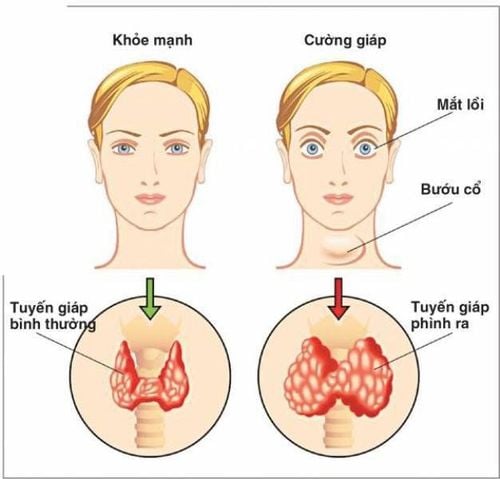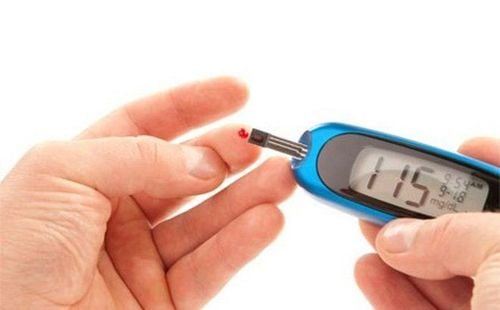This is an automatically translated article.
The article is professionally consulted by a doctor of the Department of Examination & Internal Medicine.
Hyperthyroidism and hypothyroidism are the two most common diseases among thyroid-related diseases. There are some patients who initially manifest as hyperthyroidism, but after some time after treatment, it turns into hypothyroidism if the drug is used in excess of the allowable dose for a long time without periodic monitoring at the internal medicine specialist. details.
1. Thyroid structure and common diseases
The thyroid is a small gland about 20g in weight and is located in a butterfly-shaped position in the front of the neck. This gland is responsible for secreting hormones that help regulate the body's metabolism. There are two common diseases in the thyroid gland today: hyperthyroidism and hypothyroidism.1.1. Hyperthyroidism Hyperthyroidism is characterized by an overactive thyroid gland. Because it will produce too much hormone, thereby increasing the body's metabolism and making some organs overworked, such as abnormal heart rate manifesting too quickly.
Heart palpitations with the expression of anxiety, palpitations. Common symptoms of hyperthyroidism are tremors, muscle weakness, insomnia, diarrhea, goiter, eye changes such as bulging eyes, poor concentration, decreased sex drive,...
Hyperthyroidism can lead to many unpredictable cardiovascular complications such as high blood pressure, heart attack and stroke, especially acute hyperthyroidism. When diagnosing hyperthyroidism with medical treatment (taking antithyroid drugs), surgery (when medical treatment fails or there is no indication for medical treatment), radioactive iodine when not treated by medical or surgical treatment .

Cường giáp là một trong 2 bệnh lý thường gặp ở tuyến giáp
2. When does hyperthyroidism turn to hypothyroidism?
After a period of treatment for hyperthyroidism with antithyroid drugs, surgery to remove the entire thyroid gland, and oral radioactive iodine, there are many patients who are diagnosed with hypothyroidism when they are examined again. diagnosed at first. This is a fairly common phenomenon when treating hyperthyroidism.In fact, when treating hyperthyroidism, doctors will prescribe patients to use some antithyroid drugs with the aim of controlling thyroid hormone production such as: Thyrozol 5 mg, PTU 50 mg in high doses and for a long time. If the patient has to be re-examined after a period of time to reduce the dose of the drug, for some reason the patient does not re-examine and keeps taking this medicine for a long time, then the hyperthyroidism will turn into hypothyroidism.
However, the situation is not too complicated or dangerous. Patients only need to adjust the dose of the drug, take other drugs if necessary as prescribed by the doctor, and the hypothyroidism will be controlled and the health will be fully restored. The thyroid gland will also gradually shrink as the hypothyroidism goes away.
To avoid or reduce the risk of hyperthyroidism turning to hypothyroidism, it is necessary to consult an endocrinologist with many years of experience to choose and consider the right dose of medication. On the other hand, the patient also needs to cooperate well with the doctor who needs regular and timely re-examination. Usually, every 4 - 8 weeks, patients with hyperthyroidism should be examined once. When re-examination and testing, the doctor will have a basis to evaluate the patient's current medical condition after a period of time, from there, will adjust the dose of medicine used accordingly.

Cần sàng lọc các bệnh lý về tuyến giáp định kỳ
3. Endocrine examination at Vinmec Times City International General Hospital
Both hyperthyroidism and hypothyroidism can cause many dangerous complications for the patient. Therefore, screening for thyroid disease to detect these diseases early is important in improving the effectiveness of treatment. Currently, the Endocrinology Department of Vinmec Times City International Hospital is a reliable destination for customers when they need to screen and treat thyroid disease.Vinmec Times City Hospital provides customers with comprehensive medical examination and treatment services:
The medical team are leading experts in the industry, dedicated to their work, wholeheartedly for the patients. Comprehensive and professional medical examination and treatment service. The system of modern equipment, supports the diagnosis and treatment of diseases effectively. Modern medical space.
Please dial HOTLINE for more information or register for an appointment HERE. Download MyVinmec app to make appointments faster and to manage your bookings easily.













